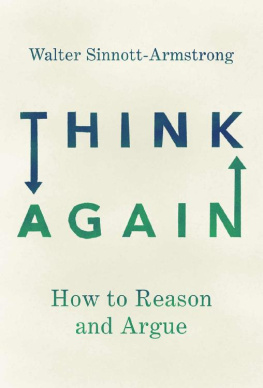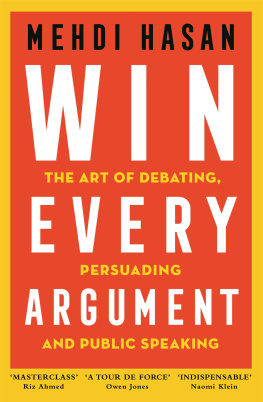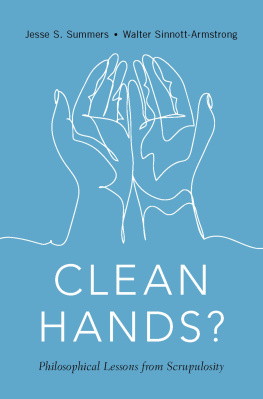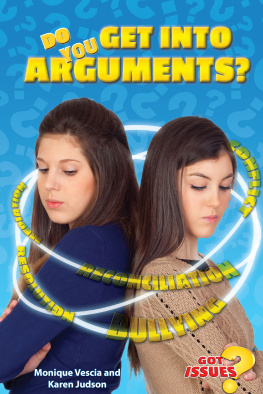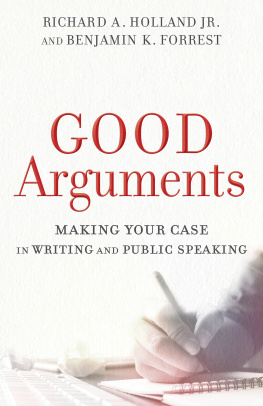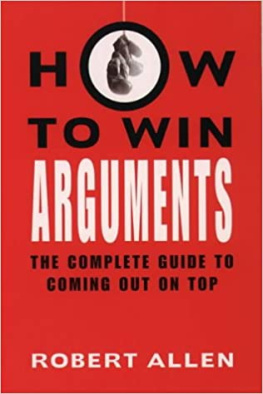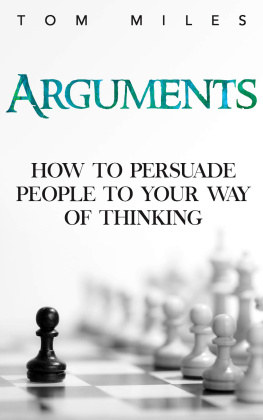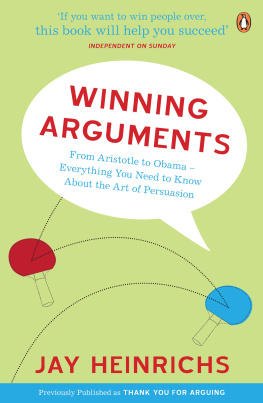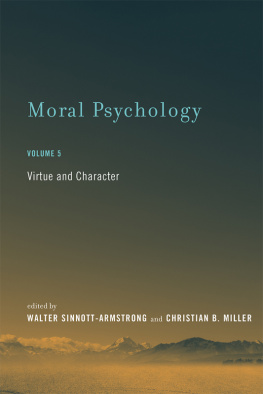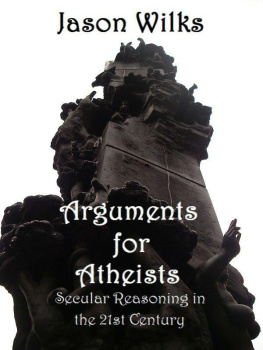THINK AGAIN
THINK AGAIN
How to Reason and Argue
WALTER SINNOTT-ARMSTRONG
Duke University


Oxford University Press is a department of the University of Oxford. It furthers the Universitys objective of excellence in research, scholarship, and education by publishing worldwide. Oxford is a registered trade mark of Oxford University Press in the UK and certain other countries.
Published in the United States of America by Oxford University Press 198 Madison Avenue, New York, NY 10016, United States of America.
Published in the United Kingdom by Penguin Books Ltd,
80 Strand, London WC2R 0RL
Walter Sinnott-Armstrong 2018
All rights reserved. No part of this publication may be reproduced, stored in a retrieval system, or transmitted, in any form or by any means, without the prior permission in writing of Oxford University Press, or as expressly permitted by law, by license, or under terms agreed with the appropriate reproduction rights organization. Inquiries concerning reproduction outside the scope of the above should be sent to the Rights Department, Oxford University Press, at the address above.
You must not circulate this work in any other form and you must impose this same condition on any acquirer.
CIP data is on file at the Library of Congress
ISBN 9780190627126
eISBN 9780190627140
In gratitude to Stacey Meyers, Lisa Olds, Diane Masters, Dana Hall, and all of the unsung heroines who enable me to do what I want.
CONTENTS
I have taught courses on reason and argument for over thirty-five years at Dartmouth College and now Duke University. Many students tell me that my courses have helped them in various areas of their lives. They motivate me to keep going.
While my students learned to argue, the rest of the world lost that skill. The level of discourse and communication in politics and also in personal life has reached new lows. During election years, my course has always discussed examples of arguments during presidential debates. During the 1980s, I had no trouble finding arguments on both sides in the debates. Today all I find are slogans, assertions, jokes, and gibes but very few real arguments. I see dismissals, put-downs, abuse, accusations, and avoiding the issue more than actual engagement with problems that matter. There might be fewer protests in the streets today than in the 1960s, but there are still fewer serious attempts to reason together and understand each other.
I could not help but conclude that our culture, like my students, could benefit from a strong dose of reason and argument. When I moved to Duke in 2010, I was offered a chance to reach a wider audience through the magical medium of MOOCs (that is, Massive Open Online Courses). With my friend, Ram Neta, I taught a MOOC (Think Again on the Coursera platform) that has attracted over 800,000 registered students from over 150 countries. This surprising response convinced me of a hunger around the world for learning how to reason and argue. Of course, not all of my students finished the course, much less learned how to argue wellbut many did. My hope is that their new skills helped them understand and work together with their neighbors.
The book that you have in your hands (or on your screen?) is another step in that direction. My goal is to show what arguments are and what good they can do. This book is not about winning arguments or beating opponents. Instead, it is about understanding each other and appreciating strong evidence. It teaches logic instead of rhetorical tricks.
Although this book began as a manual on how to argue, I realized that I also needed to start by explaining why people should argue. That motivational discussion then grew into Part I: Why Argue? The lessons on how to argue then became Part II, complemented by an overview of how not to argue in Part III. By the end of the book, I hope that you will be both willing and able to argue and assess arguments as well as to provide motivation and a model for others to join you in constructive engagement. These skills can improve not only your life but also our shared society.
I am grateful to everyone who has argued with me over many years. I have learned from you all. I learned the most from Robert Fogelin. I could not have asked for a more inspiring mentor, collaborator, and friend. I also thank Addison Merryman for research assistance, and my editorsCasiana Ionita at Penguin Press and Peter Ohlin at Oxford University Pressfor their encouragement and detailed suggestions. I benefited from discussions of these topics with Leda Cosmides, Molly Crockett, Alexa Dietrich, Mike Gazzaniga, Shanto Iyengar, Ron Kassimir, Michael Lynch, Diana Mutz, Nate Persily, Liz Phelps, Steve Sloman, John Tooby, and Rene Weber. For helpful comments on the manuscript, I thank Aaron Ancell, Alice Armstrong, Esko Brummel, Jordy Carpenter, Rose Graves, Kyra Exterovich-Rubin, Sandra Luksic, J. J. Moncus, Hannah Read, Sarah Sculco, Gus Skorburg, Valerie Soon, Jesse Summers, and Simone Tang.
This book project received generous financial support from Bass Connections at Duke University, the Social Science Research Council, and a subaward agreement from the University of Connecticut with funds provided by Grant No. 58942 from John Templeton Foundation. Its contents are solely the responsibility of the author and do not necessarily represent the official views of UConn, John Templeton Foundation, or any funder.
CALAMITIES THREATEN OUR WORLD: War is constant. Terrorism is common. Migrants seek refuge. Poverty is extreme. Inequality is growing. Racial tensions are rising. Women are mistreated. Climate change is looming. Diseases are running rampant. Health costs are soaring. Schools are deteriorating. The news leaves us overwhelmed and depressed.
These crises are gigantic in scope and scale. Because of their immensity, none of these problems can be solved without widespread cooperation. Indeed, real solutions require collaboration among diverse groups of people with conflicting beliefs and values. Its not just that warmongers need to stop fighting, racists need to stop discriminating, and ignorant fools need to learn basic facts. In addition, those of us who are neither warmongers nor racists nor fools need to work together despite our differences and disagreements. The refugee problem cannot be solved unless a number of countries with disparate goals and assumptions agree on the nature of the problem and its solution and then come together to convince everyone to do their share. The problem of climate change cannot be solved unless countries all over the world agree that there is a problem and then curtail their production of greenhouse gasses. Terrorism cannot be exterminated until every nation denies terrorists safe haven. It will never be enough for one person or even one country to decide what to do and then do it alone. They also need to convince many others to go along.
That much is obvious. What is not so obvious is why smart and caring people do not just do it. Why dont they work together to solve their common problems? Contemporary science gives us remarkable powers to learn, to communicate, and to control our futures. Yet we fail to use these abilities for good. So little gets done when so much is at stake! These same problems are bad for everyone on both sides of these disputes, even if some unfortunate groups are harmed much more than others. Nonetheless, politicians from various countries and indeed politicians within the same country quibble instead of cooperating, undermine instead of supporting, interrupt instead of listening, and draw lines in the sand instead of proposing compromises that could gain mutual agreement. Politicians add to the problems instead of solving themor they propose solutions that they know will be rejected immediately by their opponents. Some exceptionsnotably the Paris Accord on climate changeshow how countries could work together, but such cooperation is all too rare.

